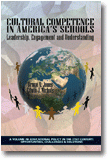
Cultural Competence in America’s Schools
Leadership, Engagement and Understanding
Edited by:
Bruce Anthony Jones, University of South Florida
Edwin J. Nichols, Nicolas & Associuates, Inc.
A volume in the series: Educational Policy in the 21st Century: Opportunities, Challenges and Solutions. Editor(s): Bruce Anthony Jones, University of Houston.
Published 2013
Cultural Competence in America’s Schools: Leadership, Engagement and Understanding focuses on explicating the impact of culture and issues of race and ethnicity on student learning, teacher and leadership efficacy, and educational policy making in our nation’s public school system. The authors agree with Levin (2012), who pointed out that the challenge of dealing effectively with racial and ethnic diversity in education in traditionally homogeneous societies is a global problem. One indicator of this point is revealed in a U.S. study that was commissioned by the National Comprehensive Center for Teacher Quality, which reported on the serious consequences for student achievement and teacher effectiveness in the face of “the gap between teacher training and the realities of the classroom when it comes to teaching diverse populations and students with special needs.” (Public Agenda, 2008, p. 2).
CONTENTS
Foreword, Madye G. Henson. 1. Origin, Meaning and Signifi cance of Cultural Competence. 2. The Philosophical Aspects of Cultural Difference: Connecting Achievement to Our Past, Present, and Future. 3. Philosophy, Beliefs and Action. 4. Relationships: The Foundation for Learning. 5. Students as Assets: Moving Beyond Deficit Beliefs and Practices. 6. Eco-Systemic Leadership. 7. Schools, Neighborhood and Community. 8. Policy, Diversity and Cultural Competence: An Interlocking Interdependence. 9. Cultural Competence: Gauging and Achieving Impact. References. Author Biographies.
-
Paperback9781623961749
Web price: $45.04 (Reg. 52.99)
-
Hardcover9781623961756
Web price: $80.74 (Reg. 94.99)
- eBook9781623961763

- EDU029000 - EDUCATION: TEACHING METHODS & MATERIALS: General
- EDU039000 - EDUCATION: Computers & Technology
- EDU033000 - EDUCATION: Physical Education
-
 College Student-Athletes
Challenges, Opportunities, and Policy Implications
College Student-Athletes
Challenges, Opportunities, and Policy Implications
-
 Contemporary Uses of Technology in K-12 Physical Education
Policy, Practice, and Advocacy
Contemporary Uses of Technology in K-12 Physical Education
Policy, Practice, and Advocacy
-
 Leading Schools in Challenging Times
Eye to the Future
Leading Schools in Challenging Times
Eye to the Future
-
 Resiliency Reconsidered
Policy Implications of the Resiliency Movement
Resiliency Reconsidered
Policy Implications of the Resiliency Movement
-
 Staff Governance and Institutional Policy Formation
Staff Governance and Institutional Policy Formation
-
 Tradition and Culture in the Millennium
Tribal Colleges and Universities
Tradition and Culture in the Millennium
Tribal Colleges and Universities
-
 Training Higher Education Policy Makers and Leaders
A Graduate Program Perspective
Training Higher Education Policy Makers and Leaders
A Graduate Program Perspective

